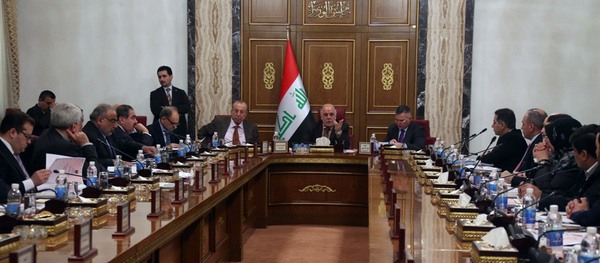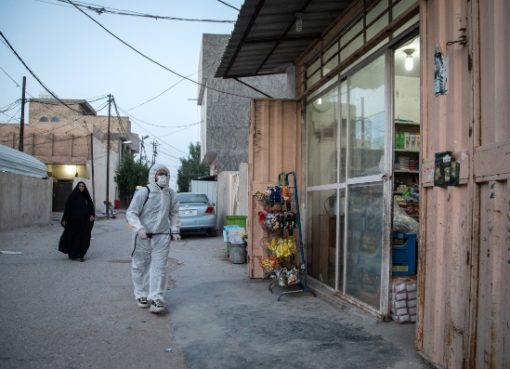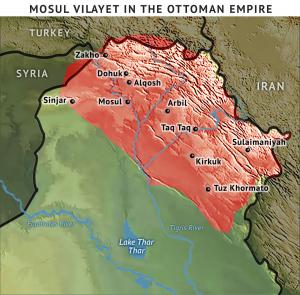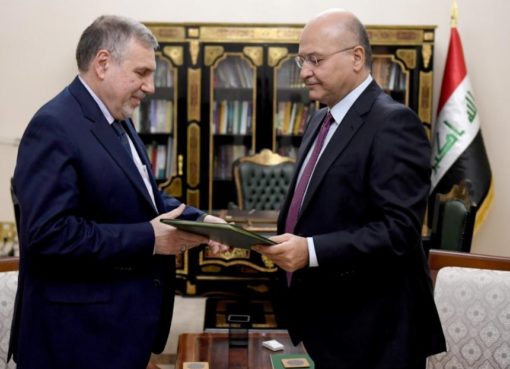Iraq’s Cabinet balanced a collapse in oil revenue while maintaining spending commitments needed to placate key constituents and keep up the fight against the so-called Islamic State (IS) militant group in a draft budget for 2015 that it approved Tuesday.
The budget calls for spending of around 123 trillion Iraqi dinars (about $102.5 billion), said Abdul Qadir Omar, a member of the Parliament Finance Committee who received a copy of the approved draft.
The draft budget will be put to Iraq’s Parliament for a first reading on Thursday, Omar said. Under Iraqi legislative procedure, a bill must pass through two readings in Parliament before a final vote.
Iraq depends on oil sales for about 95 percent of state revenue. The budget assumes an average oil price of $60, Omar said; Minister of Culture Fryad Rawanduzy, a Kurd, said the draft anticipates that Iraq will export an average 3.3 million barrels per day (bpd) of oil through 2015.
At those rates, Iraq would generate about $72 billion from oil sales in 2015 – $30 billion short of planned spending. Yet the budget draft anticipates a deficit of just 23 trillion Iraqi dinars ($19 billion), according to Omar. The reason for that apparent discrepancy was not immediately clear.
The draft budget also seeks to incorporate the terms of a political agreement finalized on Dec. 2 between Prime Minister Haider al-Abadi and Kurdistan Regional Government (KRG) Prime Minister Nechirvan Barzani. That deal would mitigate long-standing disputes over oil export rights and revenue sharing, which derailed the 2014 budget.
Kurdish ministers in the Cabinet endorsed the draft budget, Omar said, indicating that the KRG’s delegation in the Parliament is likely to vote for it as well.
“The deal that the KRG reached with Baghdad is included in the text of the budget,” said Iraqi Finance Minister Hoshyar Zebari, a Kurd.
Under the deal, the KRG will help boost federal exports by 550,000 bpd – contributing 250,000 bpd of its own production, and pumping another 300,000 bpd from fields in Kirkuk through its independent pipeline to Turkey. In return, the federal government will resume paying Kurdistan’s 17 percent share of the budget allocated for decentralized revenue redistribution, and will directly fund the KRG’s Peshmerga military forces for the first time since 2005.
The Dec. 2 agreement did not define key details of the proposed cooperation, including the status of disputed fields along Kurdistan’s southern border and the question of whether the federal government will pay KRG oil companies. It is not clear whether these controversial issues are addressed in the budget bill.
Even if it is unobjectionable to the Kurds, the budget could meet resistance from other constituents who could be disappointed by its austerity.
Iraq’s finances were already strained by reckless spending and poor budget management, even before oil prices began to fall in the second half of 2014. Iraq sells its oil at a discount to benchmarks in Dubai and Oman, which are currently $57 a barrel – almost half the amounts realized in 2013 and the first half of 2014.
Zebari said that defense and security spending accounts for “close to 20 percent” of the whole budget.
Oil producing provinces outside the Kurdistan region are likely to be angry that the draft budget does not include a $5 per barrel “petrodollar” payment to oil and gas producing provinces. The $5 petrodollar was included in amendments to the country’s provincial powers law in 2013 that were blocked in Iraq’s courts by Maliki, who nonetheless promised the $5 petrodollar in the election season this spring. Kirkuk and Basra in particular have been banking on an increase of the petrodollar from its post-2010 level of $1.
The petrodollar in the draft, said Zebari, “is for one dollar, not five.” Zebari says the petrodollar issue has not been completely resolved, and acknowledged that Basra province, which produces over 80 percent of Iraq’s oil, needs to be accommodated.
“Basra is different than the rest of the provinces, and there is more work to be done on this,” Zebari said.
Source: Iraq Oil Report
Published Wednesday, December 24th, 2014
Rawaz Tahir and Daniel W. Smith reported from Erbil. Iraqi staff reporting from Baghdad are anonymous for their security. Patrick Osgood reported from London.








Comment here